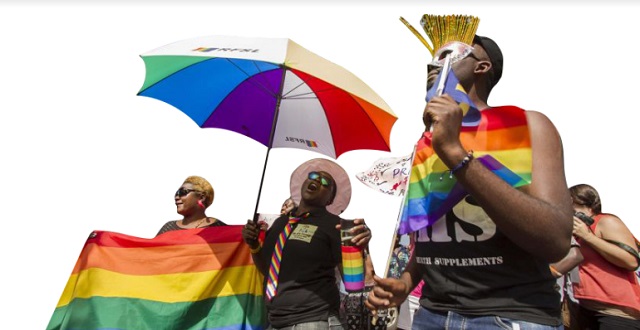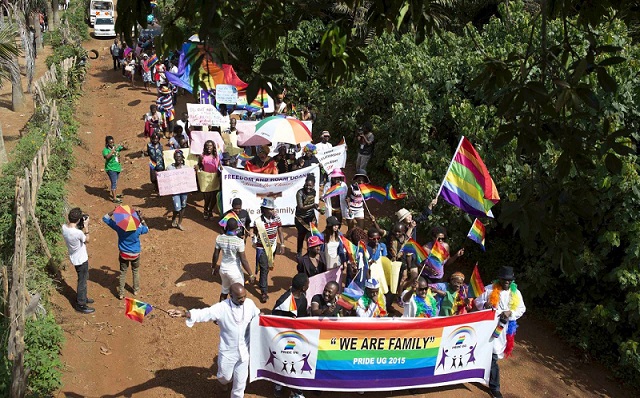
Why President Yoweri Museveni may not sign it into law now
COVER STORY | RONALD MUSOKE & AGATHER ATUHAIRE | On Tuesday, March 21, Uganda’s Parliament, for the second time in nine years, passed a law that criminalizes homosexuality in Uganda. The first law was passed in December 2013 but was nullified by the Constitutional Court on a technicality – it was passed without a quorum.
This time round, Annet Anita Among, the Speaker of Parliament, lived up to her promise of ensuring that the bill’s opponents do not get the quorum excuse again. It was passed by more than half of the number required to pass a law.
The Constitution and the rules of procedure of parliament require any bill up for voting in Parliament to be passed by one-third of the MPs eligible to vote. The 11th Parliament has 529 voting MPs and a third of this number is 176. It was passed by over 380 MPs.
“The ayes have it,” Speaker Among said, before congratulating her colleagues for passing the bill in record time. The bill was passed after ten days of rigorous public hearings and scrutiny, by the Legal and Parliamentary Affairs Committee.
MP Asuman Basalirwa, (JEEMA, Bugiri Municipality) who had moved the private member’s bill, first tabled the Anti-Homosexuality Bill, 2023, for its first reading on March 9, 2023, before Speaker Among referred it to the committee for scrutiny.
Reiterating the overall objective of the bill, Basalirwa noted that it establishes comprehensive and enhanced legislation to protect the traditional family by prohibiting same-sex relations as well as strengthening Uganda’s capacity to deal with the emerging threats to the traditional family.
Basalirwa argued that the new law would protect the “cherished culture of Uganda,” children, and youth who have become vulnerable to sexual abuse as well as prohibit same-sex marriages.
The offences
Should President Yoweri Museveni sign it into law, it will prohibit and penalizes homosexuality and its related practices. Under the new legislation, anyone who engages in same-sex activity or identifies as lesbian, gay, bisexual, transgender or queer (LBGTQ) could face up to 10 years of imprisonment. It also criminalizes what it calls the “promotion” of homosexuality and “abetting” and “conspiring” to engage in same-sex relations.
In addition, a person who is convicted of grooming or trafficking children for purposes of engaging them in homosexual activities faces life in prison while individuals or institutions which support or fund LGBTQ rights activities or organizations or publish, broadcast and distribute pro-gay media material and literature, also face prosecution and imprisonment. In this regard, media, journalists and publishers face prosecution and imprisonment for publishing, broadcasting or distributing any content that advocates for gay rights or “promote homosexuality.”
The proposed law also advocates for a death penalty for “aggravated homosexuality.” This includes sexual abuse against a child, a person with disability or vulnerable people or in cases where a victim of homosexual assault is infected with a lifelong illness. Property owners, too, face the risk of being jailed if their premises are used as a “brothel” for homosexual acts or any other sexual minorities’ rights activity.
The new law is similar to one passed in 2013 that stiffened some already existing penalties and criminalized lesbian relationships. It drew international outrage for initially proposing to punish homosexuality with the death penalty. This was later revised to life in prison. However, it was quickly struck down by the Constitutional Court.
Hostile environment for LGBTQ community
The re-introduction of the Anti-Homosexuality Bill follows months of hostile rhetoric against sexual and gender minorities by public figures in Uganda, as well as government crackdowns on LGBTQ-rights groups and other human rights groups, government critics, and civil society.
Oryem Nyeko, a researcher at Human Rights Watch noted on March 9 that: “Ugandan politicians should focus on passing laws that protect vulnerable minorities and affirm fundamental rights and stop targeting LGBT people for political capital.”
Already the environment for the minority group was hostile. Last August, the National Bureau for Nongovernmental Organizations (NGOs) banned the Sexual Minorities Uganda (SMUG), a prominent LGBTQ rights organization in the country, for not having officially registered with it.
The government had previously refused to approve SMUG’s name – a requirement to register as a nongovernmental organization – saying that a group that advocates for the rights and well-being of LGBTQ people is “undesirable and unregistrable.”
In January, this year, a draft report by the bureau identified 26 nongovernmental organizations, including SMUG, that it accused of “promoting homosexuality” and luring schoolchildren into homosexuality through “forced recruitment.”
Investigation into sex minority groups
On Jan. 25, the parliamentary deputy speaker, Thomas Tayebwa, also urged the Internal Affairs Ministry to investigate the activities of the Human Rights Awareness and Promotion Forum (HRAPF), an LGBT and sex-worker-rights group.
Tayebwa alleged that HRAPF facilitated the passing of a Kasese district bylaw that recognizes the need to protect key populations including gender and sexual minorities from HIV and tuberculosis, in keeping with Uganda’s own health policies to combat HIV/AIDS.
Then, on Feb. 5, a prominent UPDF officer, Maj. Gen. Francis Takirwa who is the deputy commander of Land Forces used the handover of a renovated community health facility and called for the exclusion of gay people from receiving health services, saying, “Don’t use our health facilities to treat homosexuals.”
On February 24, the state minister for Sports, Peter Ogwang, also called for the introduction of the death penalty for same-sex conduct. All these anecdotes culminated into the events of Feb.28 when MP Basalirwa was granted leave to introduce a private member’s Bill—the Anti-Homosexuality Bill, 2023.
While moving the motion in Parliament, Basalirwa observed that Parliament had an opportunity to correct the pass the Anti-Homosexuality Act, 2014 on Dec. 20, 2013, but it was lost. Basalirwa went ahead to describe cancer as cancer eating up the world, and urged legislators to join in ensuring the establishment of a law to curb it.
“We always talk about human rights but it is also true that there are human wrongs. Homosexuality is a human wrong that needs to be tackled through a piece of legislation,” he added.
Chairing the House that day, the Speaker, Anita Among reiterated a call to MPs to stand firm and vote for a law that will act against the vice which she said is a threat to society. “This vice has persisted and the people who are suffering are our children. We must stand up and be counted as Parliament. We need to have a law in place as regards homosexuality,” Among said.
Charles Onen (Indep. Laroo-Pece Division) cited Vision 2040, Uganda’s development blueprint that has a goal to ensure Uganda has a healthy and productive population, which is now seen to be at risk of homosexuality. “The issue at hand is a public secret and we need to treat this as an act of terror on our children. The essence of humanity is the preservation of life which is only guaranteed through procreation,” said Onen.
Sarah Opendi (NRM, Woman MP, Tororo District) called upon law enforcement agencies including the Uganda Police Force and the NGO Bureau to ensure the apprehension of perpetrators. “The promotion of homosexuality is not in legislation and therefore, we must make it an offence for those who are promoting it among our children in schools,” she said.
Sexual Apartheid in Uganda
Given the antagonistic rhetoric in Parliament, not even the educated opinion of human rights defenders like Professor Sylivia Tamale could sway the MPs to drop their proposal when she, alongside another law don, Dr. Kabumba Busingye, appeared before the committee.

Dr. Tamale, a professor of law at Makerere University, told the committee scrutinizing the Bill on March 16 that, “same-sex relations, cross-dressing and transgenderism have always been part of humanity and certainly well known in Africa.”
“Hon. Members, do not introduce Sexual Apartheid or “McCarthyism” in Uganda,” she said, referring to the 1950s American Senator, Joseph McCarthy, who she said sowed fear and hatred by accusing several people of being communists—the most hated label that could be thrown at you during that time.
“The lives of politicians, authors, actors, scholars, journalists and many others were shattered by a claim with no basis; hundreds lost their jobs; they were ridiculed and condemned by the neighbours and friends; some even committed suicide as a result.
“I wish to end with a cautionary word to honourable members of this Committee. Hon. Amama Mbabazi was the principal author of the Public Order Management Act (POMA) in 2011. When he contested for presidency in 2016, it was his POMA that the government used to stop him from moving around the country and campaigning,” he added.
Sounding prophetic, Dr. Tamale told the MPs not to be surprised when the same law comes back to haunt them one day. “All it takes is a whispered accusation from a political rival to claim that you are “gay” or that you “promote” homosexuality. A few photoshopped pictures are enough to condemn you not simply to a lost election, but to a monetary fine, jail and community shunning,” she said.
“Such ‘mud’ has a way of sticking; whether or not you are innocent does not matter; the damage will have been done. The Anti-homosexuality Bill is the perfect tool to end the political career of anyone of you, whether or not you are LGBTQ+.”
But the committee did not budge. It also disregarded one predominant view from a significant section of the public that noted that the law was unnecessary since the offences it provides for are already catered for in other laws, particularly the Penal Code Act.
Laws against homosexuality already exist
On March 17, Dr. Adrian Jjuuko of the Human Rights Awareness and Promotion Forum (HRAPF) together with the Civil Society Coalition on Human Rights and Constitutional Law (CSCHRCL) also met the committee and told the MPs that they do not support or condone sexual violence in any form.
“We are completely against the sexual abuse and violation of children, who under the law are unable to provide consent. We believe that consensual sexual relations among adults in private should not be criminalized. We base our submissions on the premise that the Constitution is the Supreme law of the land.”
When the Attorney General and the Director of Public Prosecution met the same committee, they reiterated the same view. But the proponents of the law and the committee of parliament handling the proposed law insisted the law is necessary and that there was need to enact a stand-alone law on homosexuality “because homosexuality is a unique offence which needs a specific law.”
“Whereas homosexuality as an offence already exists in the law book under the Penal Code Act, there is a need to redefine the law, emphasizing the new and emerging matters which are not contained in the Penal Code Act such as promotion of homosexuality and the recruitment of children into homosexuality which have been blamed for the rising incidents of homosexuality in Uganda,” the committee said in the report.
“The Committee also took cognizance of the need to give visibility to the offence of homosexuality by introducing a comprehensive law that deals with the offence and all its manifestations, the identification and rehabilitation of perpetrators and victims of offences as well as dealing with incidental matters such as compensation, which cannot be included in the penal Code Act, a law of general application.”
Yet, duplication is not the only concern of those against Basalirwa’s Bill. The unconstitutionality of the Bill and its implementantion are the other problems those who oppose it find.
This group which includes civil society, academics and human rights activists appeared before the committee and told them how problematic this law is. Their views which were re-echoed in the minority report by Fox Odoi (NRM, West Budama North East County) is that the law violates various provisions of the constitution which is the Supreme law.
“The Bill makes provision for the matters which infringe on the Constitution of the Republic of Uganda, 1995 including article 27 (right to privacy), article 24 and 44 relating to a non-derogable right to freedom from inhuman and degrading treatment as protected under article 24 and article 44(a), article 21 on the right against discrimination.
The Bill goes beyond the limitations envisaged in article 43 of the Constitution and some provisions contravene the principle of legality prescribed in article 28 (12) of the constitution.” The minority report reads in part.
In fact, Human Rights Activist Dr Adrian Jjuuko who met the committee on March 17 told The Independent that Parliament did not have the power to pass this law because the power conferred to them by Article 79 of the Constitution is to make laws for the “peace, order, development and good governance of Uganda” which this law instead threatens. Still, the supporters of the bill say there is no provision of the constitution that the bill contravenes.
“The committee is aware that courts in Uganda have determined that the rights and freedoms guaranteed to the constitution apply to all persons in Uganda irrespective of their real or perceived sexual orientation.”
“Court in the case of Victor Mukasa & Another vs Attorney General and Kasha Jacqueline, David Kato Kisule and Onziema vs Rolllng Stone Ltd and Giles Muhame found that constitutionally protected rights belong to all Ugandans, whatever their perceived sexuality,” says the committee report.
But the majority of the members of the committee were quick to add that, “whereas the rights and freedoms enshrined in the Constitution apply to all persons in Uganda irrespective of their sexual orientation, these rights, especially the rights articulated by the supporters are not absolute, save for those rights recognized in article 44 since they have to be exercised within the confines of the law as recognized in article 43 of the Constitution.”
They added, “the Committee is aware that the Constitution of Uganda does not recognize a right to homosexuality but instead, bans and prohibits same sex marriages.”
Those still against the bill want those who support it to show which provision in the Constitution prohibits same sex marriages. They say the bill sets a dangerous precedent to the extent that it criminalizes the appearance of people and protects anyone who attacks a person perceived to be a homosexual.
“Clause 5(1), which provides that a victim of homosexuality shall not be penalized for any crime committed as a direct result of his or her involvement in homosexuality, combined with the definition of the term victim in clause (I) as including ‘a person who is involved in homosexual activities against or her will introduce the “homosexual panic” defence, which essentially gives so-called victims leeway to harm suspected LGBTIQ persons and get away scot-free, thereby contravening the presumption of innocence guaranteed under article 28 {3) (a) of the constitution.”
This group vows to go to court if this Bill is passed into law. The Bill is waiting for the assent of the president as provided under article 91 of the constitution.
“It is therefore the position of the minority that the provisions of the bill if passed into law will infringe the rights of Ugandans, specifically the rights and freedom of expression, association, liberty, privacy, equality and freedom from discrimination, inhuman and degrading treatment and the right to a fair hearing and finds.
“If Parliament enacts this law, it will be challenged before the Constitutional Court and struck off,” reads the minority report. Should this come to pass, it will be the second time the law on homosexuality is challenged in courts of law in Uganda.
 The Independent Uganda: You get the Truth we Pay the Price
The Independent Uganda: You get the Truth we Pay the Price



Uganda 🇺🇬 as a country belongs to God Almighty. Therefore any acts of Sodom and Gomorrah shall never be tolerated in her. You the homosexuality and lesbianism supporters and practitioners will soon meet your dead-end of the road. You shall be roasted in hell forever and ever. If you don’t want to repent.
Be warned